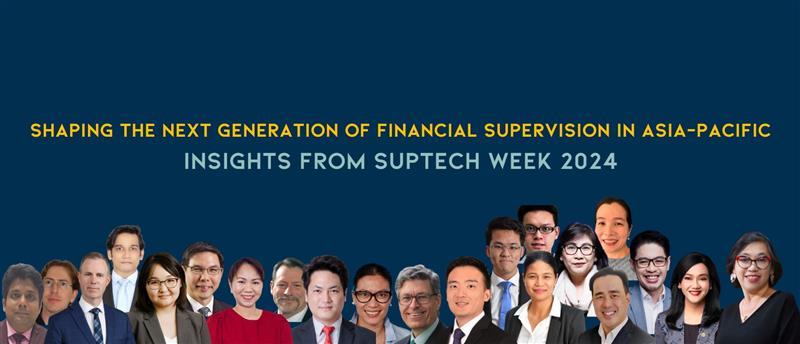Hi SupTech Community,
Welcome to the 9th issue of the Cambridge SupTech Lab bi-weekly LinkedIn newsletter, a source for updates on recent innovations, breakthroughs, opportunities and upcoming events in the field of suptech, as well as news from the Cambridge SupTech Lab team.
If you would like to flag any items for inclusion in the next newsletter, please email us at cambridgesuptechlab@jbs.cam.ac.uk. Occasionally, we also connect with our global community of supervisors, data scientists, vendors and suptech experts via email to share event invites, news or new courses – subscribe here.
In this edition, news from Bank for International Settlements – BIS, Monetary Authority of Singapore (MAS), Bank of Papua New Guinea (BPNG), Abu Dhabi Global Market (ADGM), Consumer Financial Protection Bureau (CFPB), Financial Conduct Authority (FCA) and others.
Highlighted
- Suptech Week 2023. In collaboration with the Bank for International Settlements – BIS Innovation Hub and the World Economic Forum (content partners), the Cambridge SupTech Lab will be hosting an inaugural annual event focused exclusively on technology in financial supervision. Held online, December 4-7, Suptech Week brings together the global suptech community to share ideas, solutions and research about the digital transformation of financial supervision. Organisations are welcomed to propose and organise panels, fireside chats, tech sprints, and other activities aligned with the event’s theme and objectives. Read more here.
- IOSCO finalizes its policy recommendations for crypto and digital asset markets. IOSCO, the global standard setter for securities market regulators, has published its Final Report with Policy Recommendations for Crypto and Digital Asset (CDA) Markets. These recommendations are central to the delivery of a coordinated global regulatory response to the significant investor protection and market integrity risks posed by centralized crypto-asset intermediaries called crypto asset service providers (CASPs). Read more here.
Suptech Innovations
- Monetary Authority of Singapore (MAS) unveils Gprint to promote seamless ESG data collection and access. The MAS has just launched Gprint, an integrated digital platform that harnesses technology to simplify how the financial sector and real economy collect, access and act upon environmental, social and governance (ESG) data to support their sustainability initiatives. Gprnt is the culmination of MAS’ Project Greenprint and offers an enhanced digital reporting solution for both large businesses and small and medium enterprises (SMEs) to seamlessly report their ESG information. It is currently undergoing live testing with selected banks and SMEs, and will be progressively rolled out from Q1 2024 onwards. Read more here.
- Bank of Papua New Guinea (BPNG) engages network analytics specialist, FNA to monitor intraday liquidity. BPNG’s newly formed Payment Oversight, Compliance & Monitoring Office is currently deploying FNA’s simulation and stress-testing technology to gain a better understanding of liquidity and risk within its RTGS payment system. This collaboration exemplifies the growing importance of network analytics and simulation technology, equipping central banks and financial institutions with valuable insights for informed policy decisions. Read more here.
Research Spotlight
- IMF publishes CBDC handbook. The International Monetary Fund (IMF) launched its central bank digital currency (CBDC) virtual handbook on November 15, aimed at ministries of finance and central bankers, to guide their work on the new form of money. The chapters available dive into CBDC product development, framework for exploring CBDC, monetary policy transmission, capital flow management and financial inclusion. Read more here.
- Monetary Authority of Singapore (MAS) develops Generative AI risk framework, in partnership with the industry. The MAS has announced the successful conclusion of phase one of Project MindForge, which seeks to develop a risk framework for the use of Generative Artificial Intelligence (GenAI) for the financial sector. A whitepaper detailing the risk framework will be published in January 2024. The executive summary of this whitepaper was released on 15th November 2023. Read more here.
Industry News
- Bank Negara Malaysia (BNM), Monetary Authority of Singapore (MAS) launch cross-border real-time payment systems connectivity. Person-to-person (P2P) cross-border fund transfers are now enabled via Singapore’s PayNow and Malaysia’s DuitNow. Users can transfer funds instantly between the two countries by using just the recipient’s mobile phone number or Virtual Payment (VPA) Address. This initiative follows the QR payment linkage announced on 31 March 2023 which enabled cross-border QR payments to merchants. Read more here.
- Britain’s Financial Conduct Authority (FCA) selects OneMarketData to power market surveillance system. The FCA has picked OneMarketData for the provision of a new cloud-based market surveillance and visualisation system after a competitive tender process involving 14 other providers. The vendor will provide the regulator with new tools to detect and investigate market anomalies, finding potential cases of insider dealing and market manipulation, and monitor for market disruption in real time. Read more here.
- ADGM, MBZUAI ink deal to advance artificial intelligence for regulatory compliance. The Financial Services Regulatory Authority (FSRA) of Abu Dhabi Global Market (ADGM) and Mohamed bin Zayed University of Artificial Intelligence (MBZUAI) have signed a memorandum of understanding to develop AI-based technological tools designed to assist in regulatory compliance tasks within the financial services sector. One key suptech solution set to be enhanced through this strategic collaboration is the FSRA’s ‘Risk Analyser.’ Read more here.
- USA consumer finance regulator proposes oversight over BigTech and other providers of digital wallets and payment apps. The Consumer Financial Protection Bureau (CFPB) is proposing to supervise larger nonbank companies that offer services like digital wallets and payment apps. Driven largely by Big Tech and other large technology firms, digital payment apps and wallets continue to grow in popularity, but many of the companies are not subject to CFPB supervisory examinations. Proposed rule would subject large players to the same supervisory exam process as banks. Read more here.
- Singapore partners with financial industry to expand asset tokenisation initiatives. Regulators from around the world have joined the Monetary Authority of Singapore’s (MAS) Project Guardian, which explores asset tokenisation use cases in decentralised finance (DeFi). Policymakers from Japan, Switzerland, Singapore and the United Kingdom will be collaborating on fixed income, foreign exchange and asset management digitisation pilots. Read more here.
Opportunities
- Digital fraud and banking: supervisory and financial stability implications. The Basel Committee has issued a discussion paper providing a high-level assessment of the supervisory and financial stability implications of digital fraud for the global banking system. Banks and their supervisors could both face reputational damage from digital fraud if lenders suffer major losses, the Committee warns. The paper is not a comprehensive and exhaustive analysis on digital fraud and seeks responses to the questions posed in it to be submitted by 16 February 2024. The submissions will be published on the BIS website unless a respondent specifically requests confidential treatment. Read more here.
In case you missed it…
- AI and Machine Learning for CTOs: Navigating technological evolution. Chief Technology Officers (CTOs) play a crucial role in shaping the future of organizations in the era of digital transformation. Understanding and harnessing the power of Artificial Intelligence (AI) and Machine Learning (ML) is essential for CTOs to drive innovation and remain competitive. This blog provides insights on the evolving role of CTOs. Read more here.
- Institutional Arrangements for Fintech Regulation: Supervisory Monitoring. Effective monitoring of new fintech developments is critical to authorities in achieving their public policy objectives. There are several ways to strengthen surveillance and respond to the challenges of fintech. Authorities can use existing supervisory structures to identify new fintech developments and highlight and act against any potential risks. In some jurisdictions authorities are building specialist fintech units such as innovation hubs and sandboxes to understand these developments more closely. Read more on these institutional arrangements here.
Upcoming Events
- COP28 executive panel: Supporting net-zero transition planning. Toronto Centre will be hosting a 75-minutes virtual executive panel discussing net-zero transition planning on 5th December 2023. The event will cover several topics including net-zero emissions, transition plans, decarbonization, financial regulations, supervisory expectations and prudential framework. Read more and register here.
Subscribe to our newsletter! Just send us your name and email address here. Thank you!












